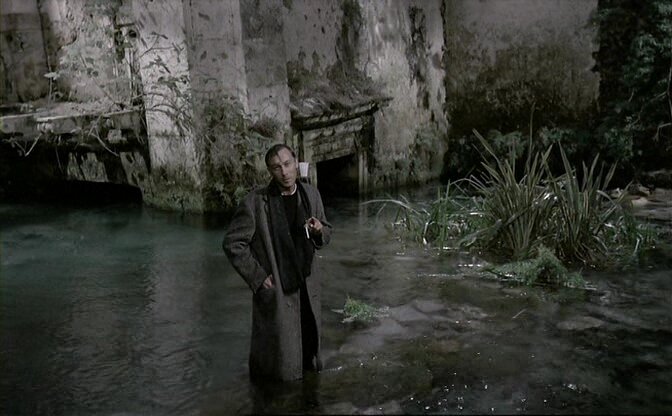Summary
A Russian writer, doing research in Italy, suffers an extreme bout of homesickness for Russia.
The Film
I’ve seen “Nostalghia” several times and while it is among Tarkovsky’s better rated films it has never been one of my favorites. His movies are slow or deliberately paced and often full of long conversations punctuated by slow tracking shots and zooms in waterlogged environments. That usually isn’t as much a problem for me as for other viewers but it is in “Nostalghia” that I find myself the most sympathetic to the Tarkovsky naysayer.
This isn’t to say that it is a bad film. I like “Nostalghia.” i just don’t like it as much as some of Tarkovsky’s other works. This is likely due, in part, to the exploration of themes that simply do not connect with me in as profound a way as a film like “Andrei Rublev” which is about art, community, good, and evil. A film about missing your home country is just not as relatable to me, a 37 year old who has never traveled much and is perfectly content to live and die within a 20 mile radius.
That being said, “Nostalghia” is a wonderful film that certainly recreates many of the feelings of longing that we feel when recalling memories of home. In fact, this film fits right in with Tarkovsky’s endless fascination with time, memory, childhood, aging, change, and death.
He plays these themes out here with flashbacks but also with the actors staging as many of the scenes are explorations of a space through movement forward, backwards looks, and pursuits of characters who are moving ahead of the protagonist who follows. As he does, I get the sense that he is chasing after his new home, Italy, as represented by Eugenia (Domiziana Giordano, “Interview with a Vampire”) even as he seems unable or unwilling to truly find his place with her.
He is distracted by Domenico (Erland Josephson, “Cries and Whispers”) a local homeless lunatic who represents Andrei’s (Oleg Yankovskiy, “The Lover”) longing for Russia, a place which formed him but has no place for the person he has become. Domenico tells him of many things but principally that if Andrei carries a lit candle from one end of a hot spring bath to the other, he will save the world. His imagination and faith are pricked by this statement so profoundly that he eventually attempts to carry out the instruction.
I may not identify with some of the longings for home that are expressed in “Nostalgia” but I do find many of them quite meaningful as they seem to not just illustrate home-sickness but also a longing for innocence, childhood, or simplicity. As we grow older, the tendency to cling to our past or use it as the touchstone for interpreting the present is an impulse that seems to also grow, at least for some. In this film, Andrei is caught between his past self which cannot be truly inhabited, only remembered and the future which can only be imagined and admired from afar.
He is trapped in the present, as we all are. In that sense, I find this movie incredibly relatable. It is the story of a man struggling to make sense of a reality he cannot put his finger on. Why can’t he be with Eugenia? Why can’t he return to Russia? Why must he simply labor on at this hotel and bath in Tuscany? There are no satisfactory answers except because he is trapped in a present where those other realities not yet have already been.
He is struggling with time, specificity, and singularity in a way that few people ever do. He isn’t running from it into the future with Eugenia, seeking to have her for himself over her partner. He isn’t running into his past, following Domenico into self destruction and analysis.
He is simply being where he is, carrying a candle, doing what little is available to him at this present moment. I’m not sure what the lesson in that is but I know that it resonates with my spirit.
What more can I ask of a film above that?
Review Written By:







